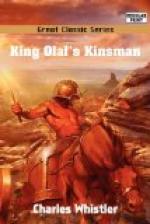I stood beside him on Ashingdon hill when he came to see to the building of the churches on the battlefield at the place of the first fight, and at Ashingdon, and at Hockley where the flight ended. And he dedicated that at Ashingdon to St. Andrew, in memory of Eadmund his noble foe and brother king, for on the day of that saint Streone slew him.
There Cnut the king stood and spoke to me:
“I build these churches, and their walls will decay in time, and maybe men will forget who built them, but the deeds of Eadmund will not be forgotten, for there are few men who have fought a losing fight so sternly and steadfastly as did he. Nor shall men forget you, Redwald, and those who fought and died here, and on the other fields that are rich with their blood spilt for love of England. None may say that their lives are wasted, for I see before us a new brotherhood that will rise out of our long strife, because Dane and Saxon and Anglian know each other for men.”
So he said, and so it is, and our England is rising from the strife into a mighty oneness that has never been hers before.
We went to London before long to see the great wedding that was made for Godwine, my friend, and Gyda, the fair daughter of Ulf the jarl, and niece of Cnut himself. There also were Relf and the lady of Penhurst, and Eldred and Sexberga, and many more of Wulfnoth’s thanes. But the old viking had gone to his place beyond the grave, and I saw him no more after I left him at Berkeley.
Godwine is the greatest man in England now, and well loved. All men speak of his deeds in Denmark, whither he took the king’s English host when troubles were there, and he is one of those who hold the kingdoms together since Ulf and Thorkel and Eirik are dead. They were slain in petty quarrels, and it is ever in my mind that it was in judgment on them for treating with Streone the traitor in the days when Cnut had not yet taken the kingship and rule into his own hands. I hold him blameless of that, for what could a boy of thirteen, however wise, do against their word and plans?
But Thrand of Colchester lives yet, being port reeve of his own town under Egil, my good friend.
None have ever seen the White Lady of the Mere again, nor has aught ill befallen my thrall, who thought he saw her. I gave him his freedom when we were wedded, and he is over the herds for us. But ever do I choose rather to call my dear one “Uldra,” the name which she borrowed from the White Lady when I met her at Bosham, and asked what I should call her, for by that name I learnt to love her.
Now one day she bade me take her to the great mound of Boadicea the queen beyond the river, for she had somewhat to show me, and half fearing I went. But she had no fear of the place, and one might see that she knew her way through the pathless woods around it well, so that I wondered. She led me across the water which stands around it in the old trench, stepping on fallen trees which made a sort of bridge, and then went to a place where the bushes grew thickly and tangled.




